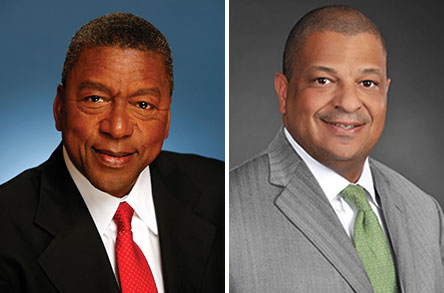Johnson, Liggins Spar Over Set-Top Rules
The smarter way to stay on top of the multichannel video marketplace. Sign up below.
You are now subscribed
Your newsletter sign-up was successful

Get complete coverage of the FCC's set-top proposal.
WASHINGTON — Black Entertainment Television founder Bob Johnson and TV One Chairman Alfred Liggins — both highly successful African-American media entrepreneurs — are on opposite sides of the debate over the impact of the Federal Communications Commission's set-top proposal on diverse programming, and the gloves are off.
In a press conference Tuesday about the proposal, Liggins, who has issues with it, said Johnson's support was because he owns Urban Movie Channel, a streaming service that would benefit from the regime, while traditional African American- and Hispanic-targeted networks including TV One, Revolt and El Rey Network could see their business model hurt if the FCC allows their content to be repackaged and monetized by third party devices, like Google's proposed box.
"To the extent that [third parties like Google] are allowed to disrupt the current programmer-cable-satellite distributor relationship and get hold of that content, and sell ads around it as well, it will significantly devalue our ability to monetize it and therefore limit our ability to produce high-quality programming that we fought long and hard to deliver to our customers."
Noting Johnson's support for the set-top proposal, Liggins said he was aware that "a friend of mine, Bob Johnson, who has a video-streaming service, is on the opposite end of this." He pointed out that Johnson, whose RLJ Entertainment launched the Urban Movie Channel streaming service in 2014, was a cable entrepreneur first and was highly successful, having sold BET to Viacom in 2000 for $3 billion.
"No, he has a new venture where he has bought a library of content and created a streaming service out of that library," which Liggins said was primarily older content, not something he was spending tens of millions of dollars to produce.
Liggins said it was great that Johnson was on those other OTT platforms and wanted to better monetize his content. But the model for the streaming business should not be "let's aggregate a TV One content, put mine next to it so I draft off their audience and then the guys who help me do that — Google — get to sell ads around it," he said.
The smarter way to stay on top of the multichannel video marketplace. Sign up below.
He said Johnson should not upend TV One, Magic Johnson’s Aspire, director Robert Rodriguez’s El Rey or rapper P. Diddy's Revolt, “or any of these other networks that sell license fees and have control of the data of our own viewership, it does not provide more quality programming for the consumer. It may help him, but it hurts more people, including more consumers, than it helps."
Johnson, now chairman of RLJ Entertainment, responded, saying it was not the FCC's job to protect a handful of established networks.
"As the founder of Black Entertainment Television (BET), I know how difficult it was to get distribution over cable,” Johnson said in a statement. “But with the support of the cable industry and the African American community, I and others, turned BET into the success it is today.”
"The universal set-top box, unlike the leased cable box, opens up the unfettered opportunity for hundreds of minority programming aspirants who would like to create content success of their own, similar to what I enjoyed with BET,” Johnson added. “ With all due respect to my good friends [Liggins] and Michael Powell, CEO of the National Cable and Telecommunications Association (NCTA), it is not the Federal Communications Commission's (FCC) role or obligation to force black Americans who have a median net worth of $13,000 to spend an average of $231 a year to lease a cable box so TV One and the cable industry can make billions of dollars off of working-class black Americans, to only have access to four black-oriented channels out of over 500 choices that principally show network reruns.” (Powell, a former FCC chairman under Republican President George W. Bush, stated his case against the rules alongside Liggins during the Tuesday conference call.)
"Furthermore, there is nothing in the FCC's proposed rulemaking that would allow technology companies to infringe on TV One's advertising revenue and relationships. On the other hand, my company, RLJ Entertainment, is well on the way to proving that programmers do not have to be totally dependent on advertising models.
"RLJE operates two over-the-top (OTT) subscription streaming channels, both of which depend on direct subscriber revenue. Acorn TV, which produces countless hours of original British mysteries and dramas, and UMC - Urban Movie Channel, through its parent company RLJ Entertainment, acquires more minority and independent films than any minority programmer on cable. And by the way, we have licensed content to both TV One and BET.
"UMC, as a minority targeted program channel, is a perfect example of the opportunity that hundreds of other minority programmers will have when the universal set-top box is implemented and their content is given equal access to the subscriber on any viewing device, particularly the television set,” Johnson continued. “Finally, the FCC should not protect minority incumbents, but should encourage new minority entrants, and that is what the universal set-top box does."
Contributing editor John Eggerton has been an editor and/or writer on media regulation, legislation and policy for over four decades, including covering the FCC, FTC, Congress, the major media trade associations, and the federal courts. In addition to Multichannel News and Broadcasting + Cable, his work has appeared in Radio World, TV Technology, TV Fax, This Week in Consumer Electronics, Variety and the Encyclopedia Britannica.

